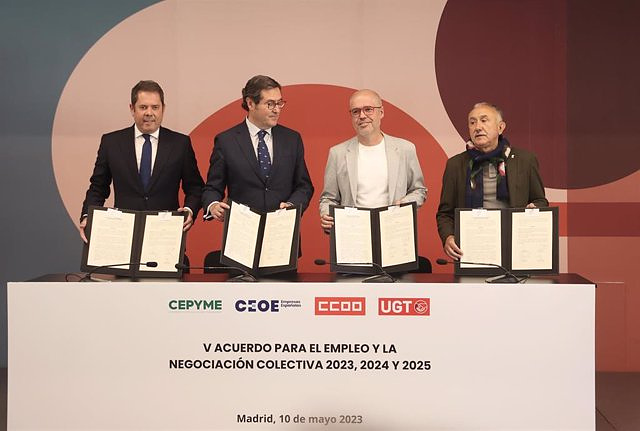MADRID, 31 May. (EUROPA PRESS) -
The Official State Gazette (BOE) publishes this Wednesday the V Agreement for Employment and Collective Bargaining (AENC) that CCOO, UGT, CEOE and Cepyme signed on May 10 and in which it is recommended to negotiators of collective agreements a global salary increase of 10% between 2023 and 2025.
Unions and employers declare in this agreement their intention to carry out in those three years "a salary policy that simultaneously contributes to the economic revival, job creation and improvement of the competitiveness of Spanish companies".
Thus, the parties recommend salary increases of 4% in 2023 and 3% for both 2024 and 2025, with a salary review clause that, in the event of a deviation from inflation, could imply additional increases of up to 1% for each one of the years of the agreement (2023-2025), which would be applied at the beginning of the following financial year.
Thus, if at the end of this year, the interannual CPI for December 2023 were higher than the 4% recommended wage increase, a maximum additional increase of 1% will be applied with effect from January 1, 2024.
In the case of 2024 and 2025, for which a 3% salary increase is recommended, the safeguard clause with that additional 1% will be activated when the interannual CPI for December exceeds 3% and will be applied to the following year, that is , on January 1, 2025, and January 1, 2026, respectively.
In any case, the agreement, which consists of 32 pages, specifies that the negotiators of collective agreements must take into account the specific circumstances of their field to set the salary conditions.
The idea, specifies the text, is that the guidelines contained in the agreement can be adapted in each sector or company, whose situations are "very unequal" in growth, results or incidence of the interprofessional minimum wage (SMI), all with the objective of maintenance and job creation.
"An advance in the growth of wages where the economic reality of the sectors and/or companies allows it, will contribute to increasing the purchasing power of working people and to continue improving our competitiveness and with it to preserve and create employment", they defend in the deal.
With regard to 2022, an exercise that has been left out of the agreement, unions and employers indicate that in the sectors and companies where their agreements have not yet been closed, negotiations will be faced "seeking solutions based on the situation and the reality of his own realm."
At the same time, the social agents advocate promoting a "rationalization" of salary structures in the agreements, integrating the principles of remuneration transparency and equal pay for work of equal value.
To this end, they consider it "desirable" to order and simplify salary supplements taking into account the gender perspective. Likewise, they urge variable remuneration systems to have objective criteria and to establish their weight in the remuneration as a whole. Likewise, they point out that flexible remuneration formulas may be taken into account in collective bargaining.
The recommendations regarding hiring made by the social agents in the V AENC are directly linked to the labor reform that they agreed with the Government.
In this way, after verifying the "good results" of the labor reform to date, they consider that collective agreements should contribute to continue in this direction by promoting job stability and the proper use of contractual modalities, developing the different appeals that the norm does to collective bargaining.
Thus, for example, with regard to the fixed-discontinuous, they advise developing through collective agreements "all the virtuality of this contract", regulating those aspects that allow a better adaptation to the needs of the workers, the sectors and companies, "including the authorization for temporary employment agencies (ETT) to carry out permanent-discontinuous contracts to cover temporary positions of the user company".
In order to maintain a contracting system that generates stability, the social agents consider that the indefinite part-time contract can be an adequate tool to meet the flexibility needs of companies and workers.
At the same time, they are committed to the fact that collective bargaining promotes the hiring of young people and people in transition in employment, promoting training contracts and dual training as a way of insertion and requalification.
CCOO, UGT, CEOE and Cepyme maintain in the agreement that partial retirement and the relief contract "must continue to be an adequate instrument for maintaining employment and rejuvenating the workforce."
To this end, they point out that the collective agreements may recognize access to partial retirement with a relief contract in accordance with the applicable regulations, and will promote, where appropriate, the mechanisms for its implementation in each of sectors and companies, depending on their circumstances and characteristics.
Likewise, they defend, gradual and flexible retirement formulas will be promoted from the agreements to facilitate the transition from active life to work retirement.
Likewise, the parties urge the Government to negotiate in the social dialogue the partial retirement reform, as the Government promised in the last pension reform.
In the agreement, the parties are committed to analyzing the evolution of temporary disability (TI) indicators derived from common contingencies and to establish action measures that improve the health of workers and manage to reduce the frequency and duration of said processes.
Among other measures, they advocate a better use of the resources of the mutuals, "without modifying the current powers of the public health services", to improve waiting times, health care for workers and reduce waiting lists in the public system.
For this, they urge the administrations with competences in the matter to develop agreements with the mutuals to carry out diagnostic tests and therapeutic and rehabilitative treatments in IT processes due to common contingencies of traumatological origin.
The parties are also committed to developing the teleworking agreement in collective bargaining and promoting employment pension plans; they recognize the right to digital disconnection outside of working hours; defend ERTEs as an alternative mechanism to job destruction, and share the need to promote real equality between men and women, the prevention of sexual violence and the culture of occupational risk prevention, as well as favoring inclusive workplaces for LGTBI people.
The social agents also put "duties" to the Government in this agreement. Thus, they call on you to adapt the current regulations for reviewing prices in public contracts to allow them to be updated in certain situations.
"Working people and companies that participate in public procurement in labor-intensive sectors cannot once again be the pagans of a norm that prevents de facto review of prices and, with it, wages, even in extreme situations such as current," they maintain.

 Exploring Cardano: Inner Workings and Advantages of this Cryptocurrency
Exploring Cardano: Inner Workings and Advantages of this Cryptocurrency Seville.- Economy.- Innova.- STSA inaugurates its new painting and sealing hangar in San Pablo, for 18 million
Seville.- Economy.- Innova.- STSA inaugurates its new painting and sealing hangar in San Pablo, for 18 million Innova.- More than 300 volunteers join the Andalucía Compromiso Digital network in one month to facilitate access to ICT
Innova.- More than 300 volunteers join the Andalucía Compromiso Digital network in one month to facilitate access to ICT Innova.-AMP.- Ayesa acquires 51% of Sadiel, which will create new technological engineering products and expand markets
Innova.-AMP.- Ayesa acquires 51% of Sadiel, which will create new technological engineering products and expand markets STATEMENT: ELFBAR and LOST MARY reveal progress in the fight against illicit vapers (1)
STATEMENT: ELFBAR and LOST MARY reveal progress in the fight against illicit vapers (1) STATEMENT: ELFBAR and LOST MARY reveal progress in the fight against illicit vapers (2)
STATEMENT: ELFBAR and LOST MARY reveal progress in the fight against illicit vapers (2) The PSOE is holding a Federal Committee this Saturday that will serve to close ranks with Sánchez so that he does not resign
The PSOE is holding a Federal Committee this Saturday that will serve to close ranks with Sánchez so that he does not resign The Ibex 35 closes the week at its highest since 2015 and is already looking at 11,200
The Ibex 35 closes the week at its highest since 2015 and is already looking at 11,200 How Blockchain in being used to shape the future
How Blockchain in being used to shape the future Not just BTC and ETH: Here Are Some More Interesting Coins Worth Focusing on
Not just BTC and ETH: Here Are Some More Interesting Coins Worth Focusing on UPV students build a prototype of a wooden house to move to Equatorial Guinea
UPV students build a prototype of a wooden house to move to Equatorial Guinea The UA opens the call for the Impulso 2024 Awards for the best innovative business initiatives
The UA opens the call for the Impulso 2024 Awards for the best innovative business initiatives ALI, virtual assistant from Alicante, internationally recognized by the OECD
ALI, virtual assistant from Alicante, internationally recognized by the OECD Retrópolis brings the golden age of video games and computing to the UPV
Retrópolis brings the golden age of video games and computing to the UPV A million people demonstrate in France against Macron's pension reform
A million people demonstrate in France against Macron's pension reform Russia launches several missiles against "critical infrastructure" in the city of Zaporizhia
Russia launches several missiles against "critical infrastructure" in the city of Zaporizhia A "procession" remembers the dead of the Calabria shipwreck as bodies continue to wash up on the shore
A "procession" remembers the dead of the Calabria shipwreck as bodies continue to wash up on the shore Prison sentences handed down for three prominent Hong Kong pro-democracy activists
Prison sentences handed down for three prominent Hong Kong pro-democracy activists ETH continues to leave trading platforms, Ethereum balance on exchanges lowest in 3 years
ETH continues to leave trading platforms, Ethereum balance on exchanges lowest in 3 years Investors invest $450 million in Consensys, Ethereum incubator now valued at $7 billion
Investors invest $450 million in Consensys, Ethereum incubator now valued at $7 billion Alchemy Integrates Ethereum L2 Product Starknet to Enhance Web3 Scalability at a Price 100x Lower Than L1 Fees
Alchemy Integrates Ethereum L2 Product Starknet to Enhance Web3 Scalability at a Price 100x Lower Than L1 Fees Mining Report: Bitcoin's Electricity Consumption Declines by 25% in Q1 2022
Mining Report: Bitcoin's Electricity Consumption Declines by 25% in Q1 2022 Oil-to-Bitcoin Mining Firm Crusoe Energy Systems Raised $505 Million
Oil-to-Bitcoin Mining Firm Crusoe Energy Systems Raised $505 Million Microbt reveals the latest Bitcoin mining rigs -- Machines produce up to 126 TH/s with custom 5nm chip design
Microbt reveals the latest Bitcoin mining rigs -- Machines produce up to 126 TH/s with custom 5nm chip design Bitcoin's Mining Difficulty Hits a Lifetime High, With More Than 90% of BTC Supply Issued
Bitcoin's Mining Difficulty Hits a Lifetime High, With More Than 90% of BTC Supply Issued The Biggest Movers are Near, EOS, and RUNE during Friday's Selloff
The Biggest Movers are Near, EOS, and RUNE during Friday's Selloff Global Markets Spooked by a Hawkish Fed and Covid, Stocks and Crypto Gain After Musk Buys Twitter
Global Markets Spooked by a Hawkish Fed and Covid, Stocks and Crypto Gain After Musk Buys Twitter Bitso to offset carbon emissions from the Trading Platform's ERC20, ETH, and BTC Transactions
Bitso to offset carbon emissions from the Trading Platform's ERC20, ETH, and BTC Transactions Draftkings Announces 2022 College Hoops NFT Selection for March Madness
Draftkings Announces 2022 College Hoops NFT Selection for March Madness























